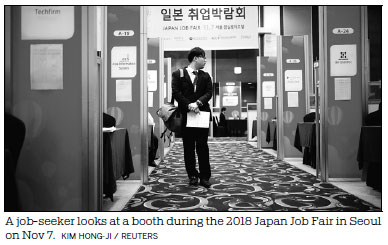Surplus South Korean graduates look to Japan, US
SEOUL - Cho Min-kyong boasts an engineering degree from one of South Korea's top universities, a school design award and a near-perfect score in her English proficiency test.
But she had all but given up hope of finding a job when her 10 applications, including one to Hyundai Motor Co, were rejected in 2016.
Help came unexpectedly from neighboring Japan six months later: Cho got job offers from Nissan Motor Co and two other Japanese companies after attending a job fair hosted by the South Korean government to match the country's skilled labor with overseas employers.
"It's not that I wasn't good enough. There are just too many job-seekers like me. That's why everyone just fails," said the 27-year-old, who now works in Atsugi, an hour southwest of Tokyo, as a car seat engineer for Nissan.
Facing an unprecedented job crunch at home, many young South Koreans are now signing up for government-sponsored programs designed to find overseas positions for job-seeking college graduates in Asia's fourth largest economy.
State-run programs such as K-move, rolled out to connect young Koreans to "quality jobs" in 70 countries, found overseas jobs for 5,783 graduates last year, more than triple the number in 2013, its first year.
Almost one-third went to Japan, which is undergoing a historic labor shortage with unemployment at a 26-year low. A quarter went to the United States, where the jobless rate dropped to the lowest in nearly half a century in April.
There are no strings attached. Unlike similar programs in places such as Singapore that come with an obligation to return and work for the government for up to six years, attendees of South Korea's programs are neither required to return, nor work for the state in the future.
"Brain drain isn't the government's immediate worry. Rather, it's more urgent to prevent them from sliding into poverty" even if it means pushing them abroad, said Kim Chul-ju, deputy dean at the Asian Development Bank Institute.
In 2018, South Korea generated the smallest number of jobs since the global financial crisis, only 97,000.
Nearly one in five young Koreans was out of work as of 2013, higher than the average 16 percent among the member countries of the Organization for Economic Cooperation and Development, or OECD.
In March, one in every four Koreans in the 15-29 age group was not employed, either by choice or due to the lack of jobs, according to government data.
Yet while increasing numbers of college graduates are moving overseas for work, South Korea is bringing in more foreigners to solve its other labor problem: An acute shortage of blue-collar workers.
"South Korea is paying the price for its overprotection of top-tier jobs and education fervor that produced a flood of people wanting only that small number of top jobs," said Ban Ga-woon, a labor market researcher at state-run Korea Research Institute for Vocational Education& Training.
Reuters

(China Daily 05/14/2019 page11)














